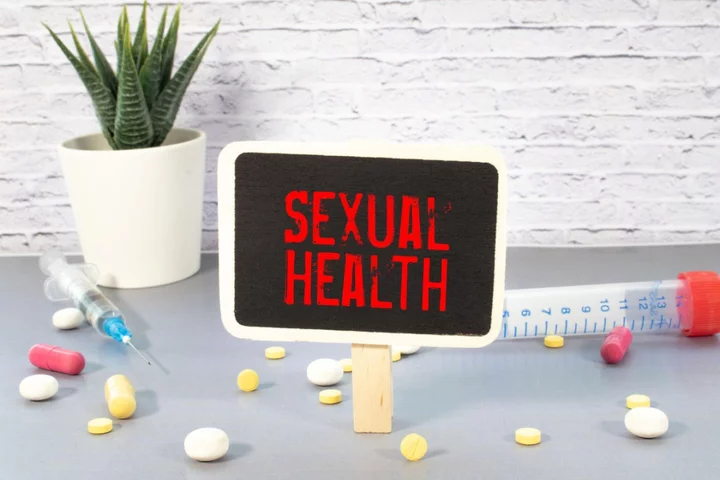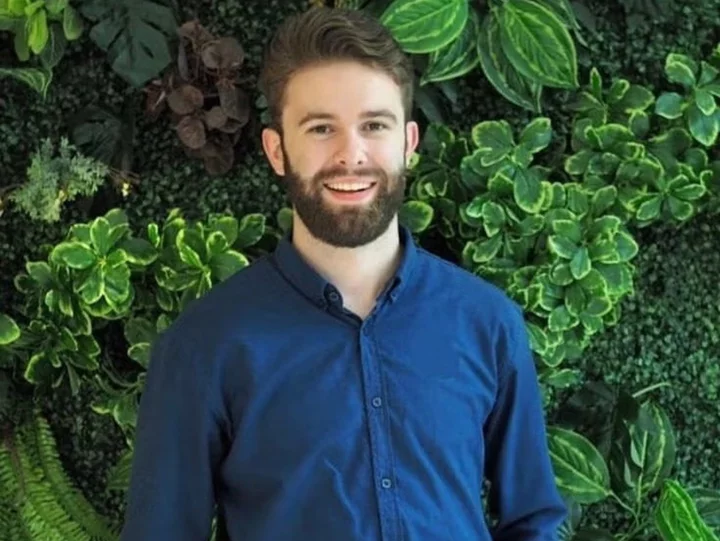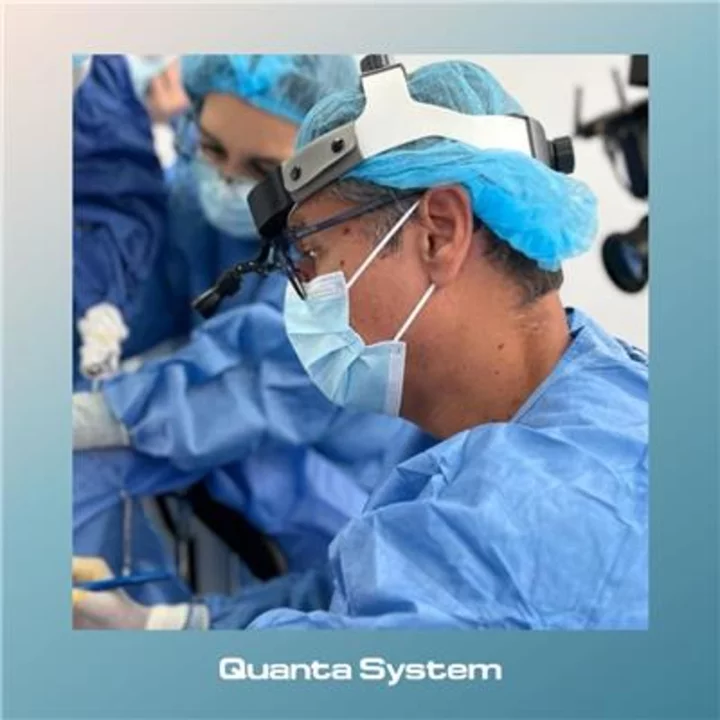
Who is Caprice Bourret? Model breaks her silence as 'toxic' Russell Brand interview resurfaces in new doc
During the interview, Russell Brand asked Caprice Bourrett some unusual questions about her lingerie collection, which she had just launched
2023-09-21 21:17

Andrew Tate and Tristan Tate present victim's statement to Romanian authorities amid ongoing lawsuit
Andrew Tate and Tristan Tate's alleged victim accused them of confining several women and brainwashing them
2023-09-14 15:25

Durex is recruiting condom testers
Safe sex is imperative — especially given a nearly 24 percent increase in STI diagnoses
2023-09-13 16:18

What happens at a sexual health check-up?
With record levels of gonorrhoea and syphilis cases reported by the UK Health Security Agency, it’s important to take sexual health seriously – and not just for young people. In fact, the number of common sexually transmitted infections (STIs) among over-65s increased by 20% from 2017 to 2019, according to the Local Government Association. This is why if you are sexually active, regular testing is necessary whatever your age – even if you don’t have any symptoms. “Sexual health check-ups are important because STIs can be silent but can also have significant health implications,” says Dr Priyanka Patel, consultant ambulatory gynaecologist at London Gynaecology. “STIs such as chlamydia can affect female fertility, and STIs such as HIV weaken the immune system.” To mark Sexual Health Week (September 11-17), Dr Patel talks through some key points about STI screening… How often should you have an STI check? “You need to have an STI check whenever you have a new partner, especially if you’re not using condoms, or think you were exposed to an STI,” says Patel. “Everyone should have an STI screen, including an HIV test, every year if having sex without condoms with new or casual partners.” Testing is also advised for anyone who develops possible symptoms. These may include unusual discharge from the vagina, penis or anus; pain when peeing; blisters, sores, lumps or skin growths on the genitals or anus; itching or a rash. What will you be asked at a check-up? You can find your nearest sexual health clinic via the NHS to book an appointment. Many sexual health services now offer free self-sampling kits to order online for people who don’t have any symptoms and want to do a check-up at home. “Men may have to hold their urine before testing, but women do not need to do anything in particular to prepare,” Patel says. “You will be asked about your sexual history, partners, contraceptive use and general health. You will be asked for details about your recent sexual partners and types of sex you have.” These questions may feel personal or intrusive but are important to ensure the correct tests are done. Remember, taking care of your sexual health is about being safe and empowered and healthcare professionals are there to help. What tests are done? “The testing will depend on the answers you give about the types of sex you have,” says Patel. “Vaginal, throat and anal swabs may be done – these will be used to test for chlamydia and gonorrhoea.” To do this, the clinician rubs a cotton bud inside the area for a few seconds. A blood sample will be taken to test for syphilis and HIV. Patel continues: “If you have symptoms, then the clinician will usually carry out a speculum examination to look at the health of the vagina and cervix.” How do you get STI test results? The way your results are delivered varies between clinics, and they will advise when you should expect to hear back. “Most will send results via a text message or give you a number to call for results,” says Patel, while some have a ‘no news is good news’ policy, meaning if you don’t hear anything then you’ve got the all-clear. For home testing kits, you’ll get a notification to say your samples were received and results are usually sent via text message. “If you test positive for an STI, they will arrange for treatment and offer support,” Patel explains – which goes for both clinic and self-sampling. She adds: “It’s important to notify partners of any positive results and the sexual health clinic can also assist in anonymous partner notification.” Read More Charity boss speaks out over ‘traumatic’ encounter with royal aide Ukraine war’s heaviest fight rages in east - follow live 9 arthritis myths we all need to stop believing Prince Harry spotted at Windsor Castle on anniversary of Queen’s death How the weather can change the way you dream
2023-09-11 15:18

TikTok star teacher is arrested for allegedly having sex with 16-year-old in Thailand
TikTok star and American English teacher Luke Rockwell was arrested in Thailand after allegedly having sex with a 16-year-old girl he met online, according to reports. Mr Rockwell, An American, was arrested in Bangkok on 2 September, NBC News reported. @English_with_teacherluke, as he is known online, appeared in court on Monday night and was released on bail, according to NBC. His TikTok account, which boasts 1.3m followers, has been set to private. According to The Bangkok Post, Mr Rockwell was accused of filming their sexual encounters. NBC News spoke to the girl’s mother, who said that the pair met in March just after the girl had turned 16. She said they met at Mr Rockwell’s home because he didn’t want to be seen in public with the minor. Although the teen and the social media influencer first had protected sex, Mr Rockwell showed medical documents to the teen that indicated he was healthy, so they had unprotected sex, the girl’s mom said. Months later, on 25 August, the teen was suffering from bleeding and pain, her mom told NBC News; three days later she told her mother about her relationship with Mr Rockwell, and was taken to a hospital before filing a police report. Five days later, the 16-year-old’s mom continued, the hospital confirmed she had STIs. On 31 August, the police issued a warrant for Mr Rockwell’s arrest. “The police could not find him still on Friday so they asked if my daughter can lure him out for a meeting and we did that together with police presence while she texted him. And that’s how he was arrested on Saturday,” the girl’s mother told NBC. “I was so shocked and it gave me a big punch in the chest. I was filled with sorrow and anger when I found out what he did [the recordings] to my daughter,” the teen’s mother added, saying she was disappointed that the influencer was granted bail. The upset mother also told The DailyMail, “Teacher Luke told her to keep everything a secret until she turned 18. He told my daughter that he loved her and would let her come live with him when she’s no longer a minor.” After the girl tested positive for gonorrhea and shared the results with the influencer, the mother told NBC, Mr Rockwell “promised that he would take responsibility for the costs.” “I’m not complaining to the police because I want money or compensation. I don’t care about the money,” she continued. “I want every woman and child to know how evil Teacher Luke is. It’s embarrassing for me to tell people about what’s happening to my family but I hope it prevents Teacher Luke from ever taking advantage of any girl in the future.” Lieutenant General Thitsit Sangsawan, commander of the Crime Suppression Division who called for the arrest operation, told NBC: “The American suspect was arrested for sex with a minor who is over 15 years old but not exceeding 18 years and recording the act of sex with a minor.” “Additionally, he is accused of taking a minor away from their parents, guardian, or caretaker without reasonable cause, willingly and intentionally,” the lieutenant general continued. “The suspect surrendered willingly and was cooperative. He has confessed to the relationship with the minor.” The case is still under investigation, police added. According to Thailand Law Library, although the age of consent in the country is 15, anyone who “takes away” someone over the age of 15 but under 18 “for indecent act with consent of such person, shall be punished with imprisonment of not exceeding five years or fined not exceeding ten thousand Baht ($280), or both.” Read More TikTok is divided on Mac’s squirt plumping gloss stick, but our beauty buffs love it TikToker sparks backlash for complaining about popular European vacation spots: ‘Dying to go home’ Death investigation underway, thousands trapped: What we know about 2023 Burning Man festival’s flooding chaos
2023-09-06 01:51

'Corsage' star admits child porn charges in Austria court
A star of the award-winning film "Corsage" about the free-spirited Austrian empress Sisi pleaded guilty Tuesday to child pornography charges...
2023-09-05 16:49

Everything you need to know about perimenopause
Claire Richards has opened up about her experience perimenopause, saying that she feels “lucky” to be experiencing it at this stage in her life. The Steps singer, 46, said on Good Morning Britain: “I feel quite lucky to be going through it [perimenopause] in a period where others have spoken out about it already. There’s a lot more information for me to find. “And I think half the population is going to go through at some point and I was surprised at how little we know as women about perimenopause, menopause, [or] anything that happens to us. Here’s everything you need to know about perimenopause... What is perimenopause? Perimenopause is the transitional period before menopause, and can occur any time between your mid-30s to mid-50s. According to The Menopause Charity, menopause is when your ovaries stop producing eggs and your hormone levels fall. Perimenopause is the gradual process before this when your ovaries start to slow down, and The Menopause Charity says it can last for a few months or several years. Menopause begins when you have not had a period for 12 months, the NHS states. What are the symptoms? The first symptoms of perimenopause are usually (but not always) changes in the normal pattern of your periods, the NHS says. Otherwise, the symptoms are very similar to what women experience once they have reached the menopause. Everyone experiences perimenopause differently, but according to the NHS, mental health symptoms can include mood changes, anxiety, low self-esteem and brain fog. Common physical symptoms can include hot flushes, restlessness, heart palpitations, migraines, muscle aches and joint pains, weight gain, dry and itchy skin, reduced sex drive, vaginal pain and dryness, and consistent urinary tract infections (UTIs). What helps ease the symptoms? Lifestyle adjustments can help ease perimenopause and menopause symptoms. The NHS advises plenty of rest, a healthy diet, regular exercise and doing relaxing things, as well as steering clear of alcohol and cigarettes. Vaginal moisturisers or lubricants can help ease vaginal dryness. Speak to your GP if you are concerned about your symptoms. Hormone replacement therapy (HRT) can be prescribed for people going through both perimenopause and menopause, replacing oestrogen as hormone levels start to drop. Talking therapy (CBT) is another option and could help with symptoms including low mood and anxiety. Read More Woman says she started to wear ‘terrible wigs’ after her job banned her pink hair Joe Wicks defends decision to pull five-year-old daughter out of school TikToker sparks backlash for complaining about popular European vacation spots: ‘Dying to go home’ Can a vegan diet help with hot flashes in menopausal women? Alzheimer’s: How and when to talk to someone about their memory loss What are gynaecological cancers and how can you prevent them?
2023-09-01 16:58

The Feminine Well-Being: Quanta System’s Laser Improves Intimate Health and Quality of Life for Women With Various Pathologies
LIMA, Peru--(BUSINESS WIRE)--Aug 30, 2023--
2023-08-30 20:28

Riders in various states of undress cruise Philadelphia streets in 14th naked bike ride
Hundreds of riders in various states of dress -- or undress – are riding through some of Philadelphia’s main streets for the 14th Philly Naked Bike Ride
2023-08-27 06:52

How did surgeons carry out Britain’s first womb transplant?
Surgeons worked all day and into the night to ensure Britain’s first womb transplant went smoothly. Its success is down to meticulous research, years of sharing knowledge between experts around the globe, and the hard work and dedication of doctors Professor Richard Smith, from Imperial College London, and Isabel Quiroga, from the Oxford Transplant Centre. Around 50 babies have been born worldwide as a result of womb transplants, which give women missing a functioning uterus a chance to have a baby. In the first UK case, the operation to remove the womb from the recipient’s 40-year-old sister lasted eight hours and 12 minutes, with surgeons leaving her ovaries behind to prevent pushing her into early menopause. One hour earlier, surgeons began operating on the 34-year-old recipient, preparing her body to receive the donated organ. This operation lasted nine hours and 20 minutes, with the surgical team experiencing some difficulties including a higher-than-expected blood loss of two litres. However, after just 10 days, the recipient was well enough to leave the hospital and has continued to have a good recovery. She is also having regular periods, which shows the womb is working well. Her sister was discharged five days after her donor operation and has also made a good recovery. Removing a womb is a similar operation to a radical hysterectomy, according to Prof Smith, who as well as being a gynaecological surgeon is the clinical lead at the charity Womb Transplant UK. He and Miss Quiroga led the team of more than 30 staff who worked on the transplant one Sunday in February. Prof Smith and Miss Quiroga removed the older sister’s womb, cervix and fallopian tubes, plus crucial blood vessels around the organ. The main vessels are the uterine arteries running into the womb, but the surgeons also aimed to collect some of the larger internal vessels that lead into the smaller branch of the womb. Prof Smith said surgeons doing these operations have to retrieve veins involved in the drainage of the womb. “One of the amazing things is that my surgical skill-mix as a cancer surgeon is to remove organs with a margin of normal tissue, while sealing the vessels as I go,” he said. “Transplant surgical skills are different – that is to remove a normal organ with the best number of non-sealed vessels as you can. “Isabel and I operate together with no ego – it just flows backwards and forwards across the table.” He added: “The day itself was truly humbling. We turned up at 7am at the Churchill transplant centre with the donor and the recipient families, then we went into a pre-op huddle. Those in the huddle included surgeons, nurses, anaesthetists and technicians. Prof Smith and Miss Quiroga worked to remove the womb, before the organ was prepared for transplantation by a “back table” team. “This was an organ which had a very, very unusual blood supply,” Prof Smith said. “In fact, it had a set of blood vessels which I’ve never seen in my entire career. They made my dissection a bit harder than it might have been, but we got there.” In the theatre next door, one hour before the retrieval of the womb was completed, surgeons began to operate on the donor’s younger sister to enable her to receive the womb. Prof Smith and Miss Quiroga switched from donor to recipient and Prof Smith removed the vestiges of the underdeveloped womb the recipient was born with. Meanwhile, the organ was packed and transported between the two theatres under sterile conditions to prevent contamination. A sterile bag with a cold perfusion solution contained the womb, which was then placed into a container with ice. During surgery, ligaments attached to the womb were attached to the recipient to help the womb stay in a relatively fixed place so it does not move around the pelvis. The most important part of the transplant operation was the joining of the very small vessels that give the blood supply to the womb. This was the most delicate and difficult part of the operation and was led by Miss Quiroga. Once all the vessels were connected, the donor’s vaginal cuff – around a 1cm part – was stitched into her sister’s vagina. If and when the recipient is able to complete her family, the womb will be removed six months later to prevent her from needing immunosuppressants for the rest of her life. Prof Smith said: “We know that the chance of failure at the point where the uterus goes in – if you look at the world literature – is 20 per cent to 25 per cent. And that failure is usually on the basis on sepsis and thrombosis. So technically, we are up to the job, but what happens thereafter can be scary. “Once you get to three or four days later, the chance of failure drops to probably less than 10 per cent. “Once you get to two weeks – and at the point where the woman has a period – the chance of her having a baby at that point is very high and the chance of failure has dropped to low. But those first two weeks – it’s very scary as a surgeon to watch and wait.” Biopsies to check the womb was functioning were read in London but then also confirmed by an expert team in the US at Baylor University Medical Centre in Dallas, where other womb transplants have been performed. Prof Smith said the procedure gives new hope to women born with devastating conditions. He said: “You’ve got girls, maybe 14, who have not had periods, they go to the GP and a scan shows there is no uterus. Absolute catastrophe. “Up until now, there’s been no solution for that, other than adoption or surrogacy... That’s not the case now. It’s really exciting.” On whether transgender women may also benefit from the operation, Prof Smith said that was still a long way off. He said the pelvic anatomy, vascular anatomy and shape of the pelvis are different, and there are microbiome issues to overcome. “My own sense is if there are transgender transplants that are going to take place, they are many years off. There are an awful lot of steps to go through. My suspicion is a minimum of 10 to 20 years.” Miss Quiroga said the living donor programme to date in the UK has focused on women with relatives who are willing to give their wombs. “It will come to a point where we will have friends or altruistic donors, like we have with many other transplants, but at the moment we’re only focused on people who have come forward with relatives,” she said. Read More Bursts of activity that make you huff and puff ‘linked to reduced cancer risk’ Fiona Phillips, 62, reveals she has Alzheimer’s disease Woman has all her teeth removed after rare vomiting condition causes them to fall out Bursts of activity that make you huff and puff ‘linked to reduced cancer risk’ Fiona Phillips, 62, reveals she has Alzheimer’s disease Woman has all her teeth removed after rare vomiting condition causes them to fall out
2023-08-23 07:19

Paramount decides it won't sell majority stake in BET Media Group, source tells AP
BET won’t be sold after all: Paramount Global decided against selling the majority stake of the network
2023-08-18 11:28

Joe Rogan criticizes teachers advocating for 'cartoon pornography' and radical gender ideology in schools: 'Real creepy'
Joe Rogan said, 'Some of them think that they have a job to do, to remove the programming of the parents that they don’t agree with'
2023-08-17 16:24
